Tao of Travel
Traveling is a lot of fun. You get to meet people, see places, and do things that are quite outside of the scope of normal everyday life. Everyone should travel. If more people traveled, I think we’d be a little closer to world peace than we currently are. Traveling gives us the opportunity to connect and understand each other. It breaks down barriers and helps us realize that we really aren’t very different from one another, that our basic human commonalities far outweigh our differences in both number and magnitude.
After spending months trying to write this article, and renaming it several times, it has made me realize something – it’s really difficult to give specific travel advice. Traveling is such a widely varying pursuit, and everyone’s experience and expectations are so dramatically different and can vary so much from destination to destination that it is extremely difficult to say stuff like “you’ll definitely need ______”. So instead of attempting to come up with some kind of definitive packing list, or definitive anything, I’ve decided to instead structure my advice around general “principles” of travel. I have tried to structure them so that they begin with more general advice, and slowly get more and more specific.
Essentials
(this list is very AP-style in that you can stop reading at any time, and have the most important items and gist. i.e. if you took only one thing with you, it would be your passport, if you took only two things with you, it would be your passport and some money, etc.)
Passport – this might seem obvious, but I’m not just saying that you should have one. Always travel with a few photocopies of the photo page. If you can be bothered, always have the phone numbers of the embassies or consulates of your country in the countries that you’re traveling to. I have so far never had to replace a passport while traveling, but I’ve seen plenty of friends do it and having a photocopy of the old one can speed the process up significantly. Also, if you have the option of getting a passport with more pages (if you travel a lot) then you should get one.
Money – Always have some cash, and always have access to more money. There is no quicker way to derail a trip than to run out of money, and it is surprisingly easy to do. Even if you have a lot of money, if you suddenly find yourself in a country where your cards don’t work, you can be in a lot of trouble. Keeping track of which currencies are used in which countries is important, as is finding a good balance of how much actual cash you carry on your person. Once upon a time, traveling through lots of European countries was a nightmare because you had to have lots of different currencies on hand, now the Euro makes this much easier. South America is a little strange because, depending on where you are, even though each country has its own currency, many places don’t want it and prefer US dollars. Then you get places like Cuba, where for political reasons, the conversion rate from USD to Cuban pesos is ridiculously expensive compared to the conversion from British Pounds, or from the Euro. There is also the consideration of not wanting to have too much cash on hand in the event that you should get robbed. It is also easier to turn down a con-man in the street trying to sell you a worthless 50 Euro “friendship band” if you can open your wallet and show them that you really don’t have any cash on you (which I usually follow up with “do you accept visa?” at which point, annoyed, they leave me alone).
Further on the subject of money, access to it has steadily gotten easier over the years. In many large cities it is possible to make bank withdrawals if your card has a “cirrus” or “maestro” logo on the back. An exorbitant fee is usually charged, so it is worth making a fewer number of withdrawals of larger amounts. Credit cards are also becoming more and more widely accepted although one must be cautious and wary of credit card fraud, which is also becoming more widely practiced. If you’re traveling through more rural or undeveloped areas, cash is generally more useful than cards. Some places will surprise you though, so it always pays to do some research beforehand and listen to other travelers who have traveled recently to your destination. The Netherlands for example is unusual in that, outside of the big cities, credit cards are useless. Even in the big cities, you can’t buy anything from a supermarket with a credit card… and this is in the country that invented insurance, and was the first modern capitalist state in the world, go figure.
Information – especially up-to-date information is very important. Visa regulations, for example, change all the time. When I traveled through France to go to Switzerland in 1995, I needed a visa just to be in transit for 3 hours. Now I don’t need one for any of the Shengen states. A more recent example is Paraguay, which I was sure didn’t require Australian passport holders to have visas when I left home (in January), but by the time I got there (in May) I needed a visa. For all I know the guy might have been making it up, because 50 USD later, everything was ok. The point here is that these things are definitely worth checking. Related to this, are fees you might get hit with at point of entry or exit. These fees are unpredictable and often have funny rules. When an Australian passport holder flies through Chile (this doesn’t apply to the land borders) a fee of 30 USD must be paid. Why? Apparently Australia does the same to Chilean passport holders who fly through Australia. However, this is a once-off fee, and doesn’t have to be paid again… ever (and for all I know, it may not even exist anymore). But little fees like this can often result in embarrassing situations in airports where you haven’t got enough money in the correct currency, and the airport has no credit card facilities.
Tied into the point about information is language – making even a token attempt at speaking the local tongue can make it ten times easier to obtain good information. Luckily, thanks to the British and subsequent American empires, English is the world’s most widely-spoken language. However, there are many parts of the world where it is not spoken AT ALL. Most of Latin America only speaks Spanish and vast swathes of Africa and the Middle East only speak Arabic or French. In China, outside of big tourist areas in big cities you will need to know some Chinese. Even in very urban Moscow, very few people speak any English. Even within English-speaking countries you may encounter difficulties with accents. Luckily, I speak with a very neutral BBC British-Australian mix and can, under duress, mimic many kinds of American, and Scottish accents (which speakers of English as a second language struggle with).
An important point to remember when speaking to someone for whom English is not their native tongue, is that their English is probably still a lot better than your French or German (or whatever you dropped out of in high school). Speak slowly and clearly, pronounce all the letters in the words, and try not to use any slang. Repeating what you just said but louder is generally not a good way to make yourself understood. Don’t be impatient. It is also useful to remember that, in verbal communication, a LOT is communicated by your tone and body language so try to accentuate that. Carrying a notepad and playing pictionary is also a great way to communicate if you really do just suck at words.
Research, research, research. The internet is a wonderful tool and it allows you to get a very good idea of the places you might visit before you get there. Weather forecasts, climate conditions, diseases to look out for, sights to see, exchange rates, useful phrases – all just a click away. Also, with the prevalence of travel blogs, one can also experience foreign destinations from many different perspectives before even booking a flight.
Tape – it might sound obvious, but it is essential to have some kind of heavy-duty tape with you. Duct tape and gaffer tape work best and are quite inexpensive and widely available. Medical tape is expensive, but generally of a very high quality. I usually travel with some kind of heavy-duty tape as well as a small roll of thin medical tape. The thin tape is for my feet, but is also good for spot-repairs on small appliances. The thick tape is useful for all sorts of things and the more off-the-beaten-trail you go, the more useful you will find it. Even on my last trip through Europe, a relatively tame trip even though it included a lot of eastern Europe, I used the small tape to repair my toiletries bag, which burst a seam, and the big tape to tape two small check-in bags together to form one larger check-in bag and avoid the extra bag fee that KLM hits you with if you check in more than one bag.
A Towel – this might seem very Hitch Hiker’s Guide to the Galaxy, but there is actually a lot of truth to this. A towel is obviously useful for drying one’s self after a shower, but it can also double as a makeshift beach towel, a tourniquet, and even a tablecloth. Towels are also surprisingly useful for emergency situations – maybe you get a bleeding nose and there are no tissues around (like, for example, if you’re riding an elephant at the time), maybe you’ve visited a holy site and forgot to bring something to kneel on, or maybe you have an unexpected sexual encounter – you get the point; towels are useful. I’m personally a big fan of these slightly overpriced microfiber towels. They are very thin, light, pack into a small space, and do two things very well – they dry you well, and they themselves dry very quickly.
General Advice
Less is more – packing light has become easier and easier. The outdoor clothing industry is big business and as a result we have a myriad of space-saving gadgets to help us with our packing. An outdoor clothing shop is the most likely place for you to get one of those space-saving microfiber towels, for example. As for clothing, check the average temperature of your destination during the time you’ll be there and pack accordingly. Dress in layers and choose your clothing combinations to be as versatile as possible, i.e. don’t pack a pair of pants that only goes well with one shirt. Choose clothing that is easily washable, and that dries quickly. Until recently, clothing that did this was a bit limited style-wise and generally made you look like you were a regular at Mount Everest base camp. Luckily things have improved, and the range of this kind of “travel-convenient” clothing has expanded dramatically.
Gadgets are wonderful things. I still travel everywhere with a laptop to deal with the obscene amount of photos that I take wherever I go, but with the advent of netbooks, and soon, slate tablet computers, even this will become less and less of a burden. My iPhone too has made things easier, as it combines phone, notepad, gps, diary, gaming console, torch, and music box (and camera, if your standards aren’t as high as mine) into one device. The ability to surf the internet and access just about any information you can think of (and a lot of information that you can’t think of) is truly a godsend and the combination of all of these things has aided me greatly in my travels. As a general rule, anything that can serve more than one function should be chosen over something that serves only one function. Camera flash cover that also functions as a teacup – take it, hair gel that also functions as an adhesive – take it, mosquito spray that doubles as a cream substitute for your coffee – you get the idea.
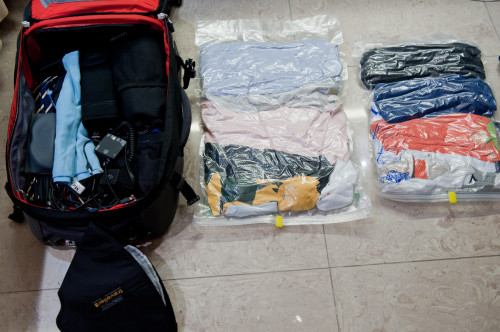
2 months in Europe – note the compression bags for my clothes, and that most of the space in my bag is taken up by photo gear.
Local knowledge – us it. Guidebooks are wonderful, as is google and wikitravel, but few things are more valuable (and rewarding) than having a local show you around their hometown/country. I’ve been extremely lucky in that throughout my life I’ve been exposed to environments which have allowed me to meet and get to know many people who live all around the world. Getting a local’s perspective isn’t just a page out of stuffwhitepeoplelike, but is your best chance at understanding what it is really like to live in a place. In addition, a local will be able to give you a much more authentic cultural experience including food, social life, and (if you time your trip well) festivals. Think about it, if someone from Hungary, Romania or Denmark (just to use some recent examples) were to visit your home, you would totally be able make sure they get a better experience and see better stuff than your standard whistle-stop package tour. Hanging with a local is also a kazillion times safer than bashing it like a tourist because having a local with you, who can order in the local language, and buy you public transport tickets without the extensive use of sign language, gives you the kind of street cred that keeps unsavoury types at bay (unless your local is a local drug dealer or pimp, in which case it may not be as safe).
Group up – traveling alone can be very rewarding, and I’ve done it quite a lot, but it presents many challenges which disappear when you travel as a group. There are many advantages to traveling in a group aside from the good company: it allows you to pool resources more easily, it is safer, it makes it a hell of a lot easier to go to the toilet (you don’t have to take all your stuff with you) while in transit, and it also ensures that you get one of two photos that actually have you in them. It can also give you more bargaining power when negotiating the price of tours, as well as making things cheaper.
For the same reasons that groups are much more effective at trivia nights than single people or pairs of people, traveling in a group allows you to use your collective knowledge and travel experience to more effectively get stuff done. However there is more to benefit from than simply the pooling of knowledge – throwing different people together means that there is a greater chance of having different personalities. The mixing of different personality types can make for conflict… but if you can behave like adults, it can also be quite a positive boon – some people are just better suited to dealing with cranky russian train ticket inspectors, while others are just good at checking all of the little details, like making sure everyone has all of their stuff with them.
Use the post office – If there was a postal equivalent to frequent flying miles for using post offices, then I would probably have a few… umm… free packages by now. As I have become more experienced with travel, I have gotten better at not accumulating useless things along the way. I generally don’t buy souvenirs for people unless it is a very special occasion, like a wedding. Even without the accumulation of stuff, it often happens during a trip that you realize you don’t really need a certain item, or commonly, after a section of your trip spent say, rock climbing, all your rock climbing gear becomes useless. It is a good idea to post the gear home. Of course one should beware of the quality of the postal service in whichever country you happen to be in. You’re pretty safe when it comes to advanced industrialized countries like Denmark or Australia, but if you find yourself in Cuba or Mexico, then finding a DHL or FedEx might be a safer bet.
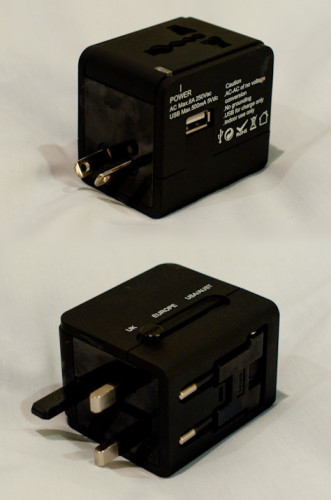
absolutely essential – the multi-adaptor (newer models come with USB slots for charging smartphones)
Specific Advice
Power – electricity may or may not be a crucial element in your travel kit. I usually travel with a laptop, a phone, and a LOT of photo gear so it’s very important to me. All of this stuff needs charging. Luckily, these days the power adaptors for most appliances will accept any voltage meaning you don’t have to carry a transformer around with you (and those things are HEAVY). To prevent confusion with plugs, I generally only travel with appliances with american plugs (for no other reason than they are the most compact). I carry one adaptor (photo above) and one surge-protecting powerboard which takes three US-style plugs. Spare batteries for devices are essential – cameras, camera flashes, phones, flashlights.
Scams – more than just an annoyance, some scams can be quite elaborate and can completely ruin a trip. These are most common in poorer countries, but can also be encountered in wealthy countries where there is a high degree of income inequality. Obviously you should always try to blend in with the locals, but often this is simply not possible (there aren’t many asian people in Romania, for example). Unfortunately it is very difficult to avoid certain scams, but a few general rules of thumb will help you stay out of most trouble.
Do not ever hand over your passport, even if a person looks very official. Border checkpoints, embassies, and airports are the only safe places to hand a passport to someone else, and even then you should keep it in your sight. An illustrative (true) short story:
I was walking to the train station, about to leave Budapest, Hungary recently when a man came up to me at a quiet intersection asked for directions. Knowing the area quite well (it was near my hotel) I stopped and tried to help him when another man claiming to be an undercover policeman approached us and demanded to see our passports. He flipped open his wallet to reveal questionably-authentic police credentials and the other man (who had just asked for directions) quickly handed his passport over. Luckily I was paying attention quite closely to what was going on, and I detected in the body language of the two men that they knew each other (they were pretty terrible actors) so I was immediately suspicious. At first I refused, and as the “policeman” became insistent, I took my passport out and showed him the photo page, but steadfastly refused to hand it over. I stared him down for an awkward minute or two until he relented and then tried a different tack. He asked to “check our cash” at which point I went from 99% to 100% sure that this was a scam. I told him that I wouldn’t give him my cash, and if he was a legitimate policeman, then I would go back to a police station with him and we could sort it all out. Then I started walking away.
You just have to keep your wits about you and be very wary. If you have an autism spectrum disorder, even a mild case of asperger’s, then you should really travel with a friend who is good at playing poker if you intend on going anywhere off the well-worn tourist trail.
Beggars – as a general rule, I don’t give money to beggars. This might seem strange coming from a bleeding-heart liberal such as myself, but after much thinking about ways to end poverty, I’ve decided that giving money to beggars doesn’t accomplish anything. It is emotionally difficult for me not to give money to beggars because I do feel a great deal of pity for them, but in the grand scheme of things, if I give my spare change instead to a donation tin at a homeless shelter, or an NGO (things like UNICEF‘s change for good program) then my money will accomplish more. I guess the point here is that you shouldn’t give your money to beggars, but instead give that money to organizations who are working to ensure that the begging doesn’t need to happen. (however, in what may be viewed as very hypocritical, I will give money to buskers, but only if they play their instruments well).
Crime – it happens. It happens everywhere. Don’t be afraid of it, because most of it is just a little bit inconvenient and not life-threatening. Avoiding crime is a combination of commonsense (dimly lit alleyways at midnight? maybe steer clear of those…) as well as being alert and astute. For someone like me, it is a little easier because I’m male, very strong for my size, and an unusually fast runner. Those attributes may make it easier for me to get out of a sticky situation, but what they really do is make me a less likely target. A petty thief after a snatch-and-grab would probably see me and think “too hard” and move onto a short overweight girl with a limp who is asking every other passer-by if they speak English. Hotel rooms are a bit of a mixed bag. Don’t leave passports in hotel rooms. An interesting strategy I’ve heard from a few other travelers is to have a “fake” wallet with a small amount of cash, and expired credit cards to hand over in the event of a mugging.
Travel insurance is a good idea if you’re traveling to a country like Colombia, where the chances of being robbed (even from a supposedly secure hotel room) are high. Also make sure you have contact details for your credit and debit cards so you can quickly cancel them in an emergency (actually, it’s easier to keep those numbers safe with someone at home and just call them in an emergency, and they can make all the necessary calls).
Sim cards – a nomadic existence can be expensive, and this can manifest itself especially acutely in the cost of making mobile telephone calls. Most carriers offer international roaming on their phone plans, but it can be extremely expensive. It is slowly getting cheaper, but if you’re like me and seem to have no permanent residence, it is also very difficult to get a phone plan and you end up only having prepaid numbers, which either don’t offer roaming, or offer it at an exorbitant price. Add to that my *need* to have data access on a 3G network and things can get complicated. So far my best solution has been a mixed strategy of cheap prepaid sim cards from countries that offer them with data, and a special-purpose roaming sim with which I can make and receive calls and text messages from 230 different countries (most of which I can’t even name) and data in most of those countries (so far Hungary and Denmark are the only two where I haven’t been able to get data). The romaing sim is tremendously convenient, but also quite expensive to use (but less expensive than the international roaming charges of most carriers). In addition to this, I have had to cut up all my standard sim cards to make them micro-sim-sized to fit into my iPhone 4. Someday, when a more advanced version of the iPad comes along, I will probably have to work something out for that too.
Meds – I’m generally not the sort of person who pops pills, but when traveling, one should be prepared to. First there are pills designed for diarrhea – one should be cautious with these though because often it is good to just “get it all out” so to speak, because these pills work by “blocking up the pipes” so to speak. There are various pills available for motion sickness as well as natural remedies involving wristbands and acupuncture points. In any case, I am so susceptible to motion sickness (especially on boats) that none of these remedies work, so I don’t even bother. For sleep, there is melatonin which works on your body’s endocrine cycle rather than simply sedating you. This has several advantages, the first being that it will help your body clock adjust to new time zones faster, and secondly normal sedatives help you fall asleep, but the quality of your sleep is often adversely affected (this also happens when you drink yourself to sleep). Then of course there is doxycycline for malaria prevention (or lariam, if you don’t mind having trippy dreams).
Also included in the “meds” section is vaccines. Do some research into where you’re going and get the necessary vaccines. Most clinics will be able to advise you on which vaccines are required for which regions of the world, and longer trips will generally require more jabs. Also pay attention to legal requirements – in Australia, if you’ve traveled to Africa or South America, they won’t let you back in the country unless you have a certificate saying that you’ve had a yellow fever vaccination.
Clothes – don’t take too many. It is also good to keep in mind that if you’re going somewhere with a particularly harsh or extreme climate, then the kind of clothing you will need will not only be more readily available there, but it will probably be cheaper too. As was shown in a previous photo, I pack my clothing into compression bags which not only serve to reduce the space taken up by the clothing, but also keeps them dry in the event that they are exposed to water (or your bottle of contact lens solution leaks on the plane). I usually pack about three full sets of clothes and mix and match them. I always take no-iron shirts, and I always choose the ones with breast pockets, which are useful for boarding passes, train and bus tickets, and pocket calculators if you’re going for the nerdy look. You should also take at least one item of clothing (preferably an accessory like a hat or glove) which is really brightly coloured. This is useful for being spotted in a crowd, or from a distance, which is important when meeting up with people, especially if they don’t know what you look like, so you can say “I’m the one with the orange gloves”.
Photos – take lots. The advent of digital photography has made this easier than ever. You don’t need to worry about carting film around with you, nor do you have to worry about getting it developed. It is also a lot easier to share your photos (this website is proof enough of that) than it used to be. It is the author’s opinion that it is worth carting around a large SLR camera along with several lenses as well as an external flashgun. Even if you don’t hold a similar view, there are still plenty of compact cameras out there now with large image sensors which can take photos of near-SLR quality. For anyone out there who is wondering, I travel with a Nikon D700 with the 24-70mm f/2.8 lens as my primary “walk-about” lens. I also pack an SB-900 flashgun and a fairly large lightbox attachment to go with it. As for lenses, I will usually bring along a 60mm macro lens, and maybe the 70-200mm f/2.8 depending on whether or not I think I’ll have to take photos of things from far away. I have written more extensively on photo gear elsewhere on this website. I usually also travel with a laptop of some kind so that I can upload the photos to the internet as quickly as possible. For those with a less-overdeveloped sense of urgency, a handful of high-capacity SD cards should be enough to get you through a trip.

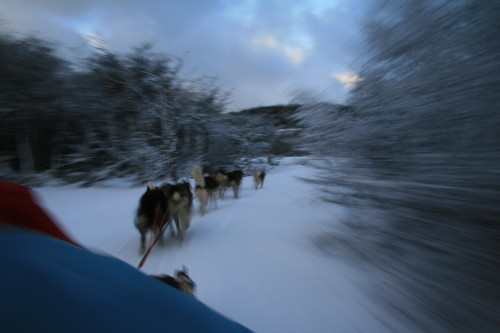
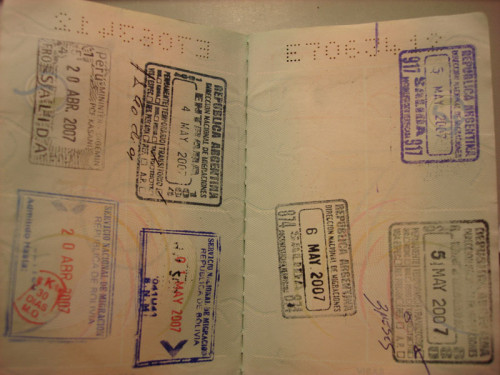
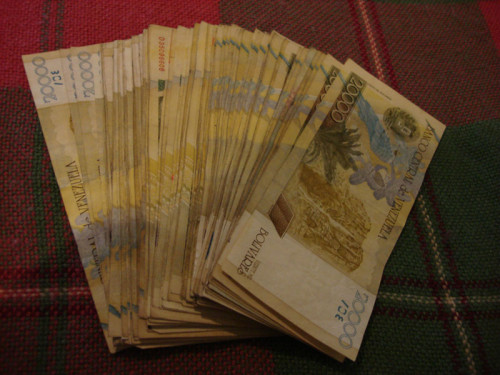
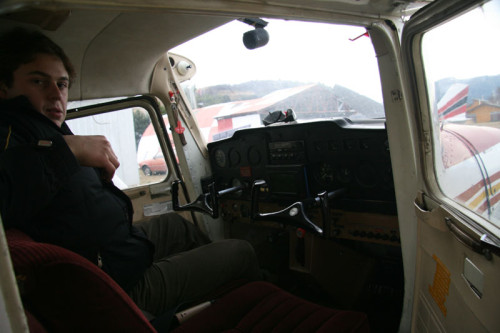
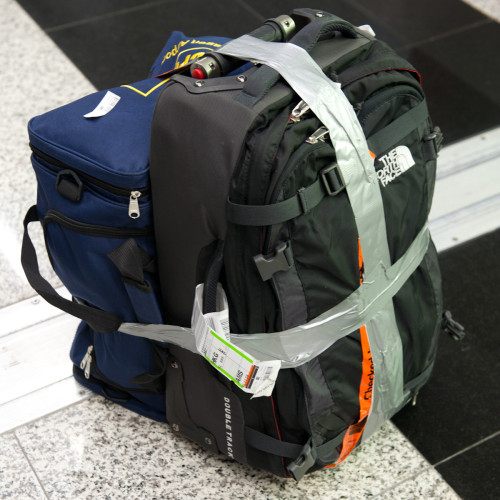
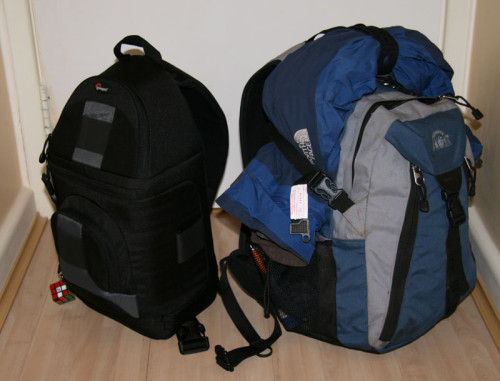
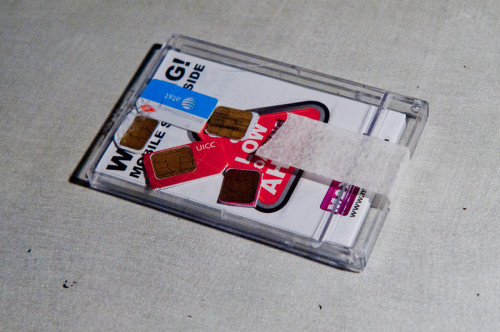
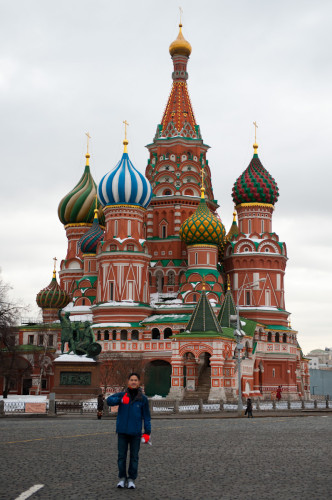
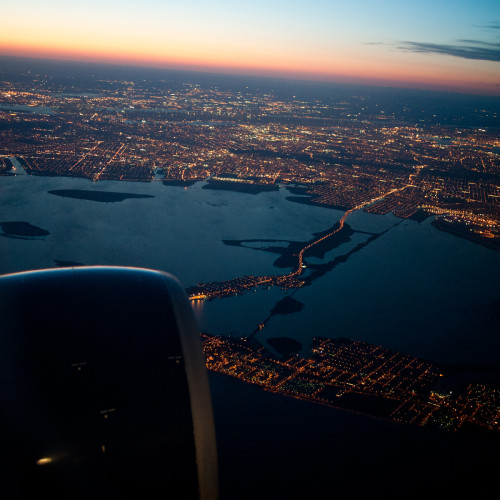
Leave a comment